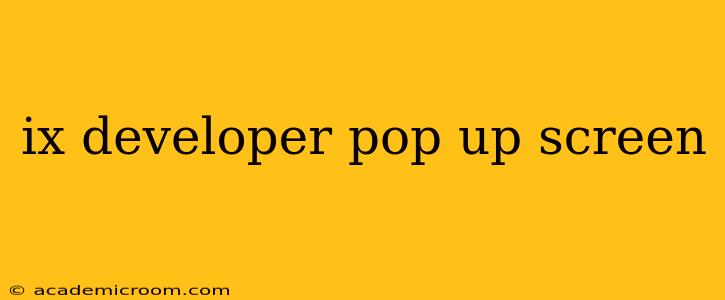The "IX Developer pop-up screen" is a broad term, encompassing various types of pop-up windows used within software development environments employing IX (Interaction design) principles. These pop-ups serve diverse functions, from displaying error messages and debugging information to providing quick access to tools and settings. Understanding the nuances of designing effective and user-friendly IX developer pop-ups is critical for enhancing developer productivity and satisfaction. This article will explore best practices, common use cases, and essential considerations for creating seamless pop-up experiences within IX development workflows.
What is a Pop-Up Screen in IX Development?
In the context of IX development, a pop-up screen refers to a transient window that appears overlaying the main application window. It's designed to deliver specific information or solicit user input without disrupting the primary workflow. These pop-ups can range from simple alerts displaying brief messages to complex dialog boxes requiring multiple inputs and actions. Effective IX design principles are vital to ensure these pop-ups are not intrusive but rather helpful and intuitive.
What are the Different Types of Pop-Up Screens Used by IX Developers?
Several types of pop-up screens are commonly used in IX development. Let's examine a few:
- Error Messages: These pop-ups inform developers about errors encountered during code execution. Clear, concise error messages with actionable suggestions are crucial for efficient debugging.
- Confirmation Dialogs: These pop-ups ask developers to confirm actions that may have irreversible consequences (e.g., deleting files or overwriting data). They require explicit confirmation before proceeding.
- Information Dialogs: These pop-ups display informative messages, such as progress updates or notifications. They are generally less critical than error or confirmation dialogs.
- Settings Dialogs: These allow developers to adjust application settings, customize preferences, or access configuration options. Well-organized settings dialogs are vital for a positive user experience.
- Debugging Tools: Some pop-ups provide direct access to debugging tools, allowing developers to inspect variables, step through code execution, and diagnose issues effectively.
How Can I Improve the User Experience of My Pop-Up Screens?
Designing user-friendly pop-ups is paramount. Here are some crucial considerations:
- Clear and Concise Messaging: Avoid technical jargon and use plain language. Ensure the message is directly relevant to the situation.
- Strategic Placement: The pop-up should appear in a position that doesn't obscure critical elements of the main application window.
- Appropriate Size: The pop-up should be large enough to display information clearly, but not so large that it becomes overwhelming.
- Consistent Design: Maintain a consistent look and feel across all pop-ups within the application. Use the same fonts, colors, and layout styles for a cohesive experience.
- Accessibility: Ensure pop-ups are accessible to developers with disabilities. Consider keyboard navigation, screen reader compatibility, and sufficient color contrast.
- Cancel/Close Functionality: Always provide a clear and prominent way to dismiss the pop-up.
What are the Best Practices for Designing Pop-Up Screens in IX Development?
Adhering to best practices ensures efficient and effective pop-up design:
- Prioritize User Needs: Focus on solving developer problems and improving workflow.
- Minimize Distractions: Avoid unnecessary pop-ups or overwhelming information.
- Provide Feedback: Let users know what’s happening during lengthy processes. Progress bars or notifications can reduce frustration.
- User Testing: Test your pop-ups with real developers to identify potential usability issues. Gather feedback and iterate based on user input.
How Can I Ensure My Pop-Up Screens Are Accessible to All Developers?
Accessibility is crucial for inclusive design. Here's how to ensure your pop-ups are accessible:
- Sufficient Color Contrast: Ensure text and background colors provide enough contrast for readability.
- Keyboard Navigation: Allow users to navigate pop-ups using the keyboard alone.
- Screen Reader Compatibility: Ensure pop-ups are properly structured and labeled for screen readers.
- Alternative Text for Images: If you use images in your pop-ups, provide descriptive alternative text.
By carefully considering these aspects of IX developer pop-up screen design, you can create an efficient, user-friendly, and accessible development environment. Remember that the goal is to enhance developer productivity and satisfaction, not to disrupt their workflow.
